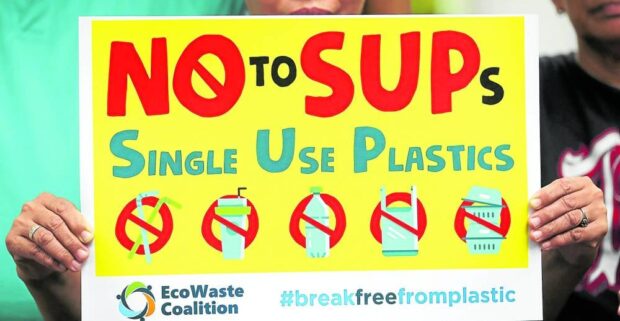
INQUIRER FILE PHOTO
CEBU CITY, Cebu, Philippines — Officials of the coastal town of Cordova on Mactan Island, Cebu, have started to implement an ordinance barring commercial establishments from providing single-use plastic and Styrofoam packaging when they sell their items to customers two days a week.
The ban is being enforced every Wednesday and Saturday and is intended to reduce plastic pollution in the municipality.
Exceptions are made for certain liquid products or food items that can melt.
“While this may inconvenience people, we need to do it for the love of Cordova and the environment,” Mayor Cesar Suan said.
To further achieve the goal set by the ordinance, Suan said, children and teenagers should be taught how to properly dispose of single-use plastics or reduce their reliance on such packaging materials.
The ordinance applies to “all persons who live and sojourn within the town, including the owners, partners, and corporations who are operating department stores, hotels, restaurants, stalls in the public/private markets, canteens, convenience stores, “sari-sari” stores and other similar establishments.”
During the two “no plastic” days, everyone in the town engaged in retail—whether selling dry or wet goods, appliances, and other commodities — may only use biodegradable or reusable packaging or containers, such as paper bags, rattan baskets, or net bags.
Some exceptions
Single-use plastics may still be used on those two days for sauces, ice water or ice candy.
The use of plastic drinking straws is also “absolutely prohibited in all stores, restaurants and other business establishments within the municipality.”
Violators face fines from P500 to P2,500 per violation, as well as the revocation of their business permit.
“Plastic pollution is both an environmental and social justice issue since the ones who are most adversely affected, especially during heavy downpours, are poor communities and settlements,” read the ordinance authored by Councilor Lemuel Pogoy.
Based on data from the Environment Management Bureau of the Department of the Environment and Natural Resources, the Philippines has become the third largest source of marine plastic pollution, next only to India and China. The country generates up to 27 million tons of plastic per year, a volume projected to swell to 91 million tons by 2025.
Based on another estimate made in an October 2022 report of the World Wide Fund for Nature, Filipinos use a total of 2.15 million tons of plastics every year, with only 9 percent of the waste (83,000 tons) being recycled.
Another study, done by the environmental group the Global Alliance for Incinerator Alternatives (Gaia), said 163 million plastic sachets are used in the country every day, or 60 billion sachets each year, enough to blanket 130,000 football fields.